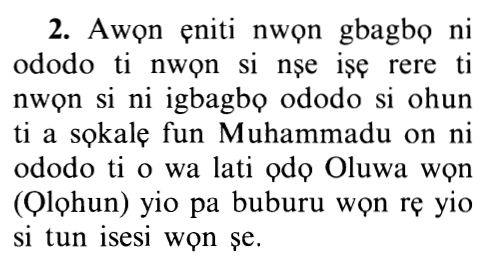47vs2
Select any filter and click on Go! to see results
وَالَّذِينَ آمَنُوا وَعَمِلُوا الصَّالِحَاتِ وَآمَنُوا بِمَا نُزِّلَ عَلَى مُحَمَّدٍ وَهُوَ الْحَقُّ مِن رَّبِّهِمْ كَفَّرَ عَنْهُمْ سَيِّئَاتِهِمْ وَأَصْلَحَ بَالَهُمْ
Waallatheena amanoo waAAamiloo alssalihati waamanoo bima nuzzila AAala muhammadin wahuwa alhaqqu min rabbihim kaffara AAanhum sayyiatihim waaslaha balahum
Index Terms
Click to play
Yoruba Translation

Hausa Translation
Kuma waɗanda suka yi ĩmani, kuma suka aikata ayyukan ƙwarai, kuma suka yi ĩmani da abinda aka sassaukar ga Muhammadu, alhãli kuwa shĩ ne gaskiya daga Ubangijinsu, ( Allah) Yã karkare musu miyãgun ayyukansu, kuma Yã kyautata hãlãyensu.
Asbabu n-Nuzuul (Occasions of Revelation)
Allah then says,
وَالَّذِينَ آمَنُوا وَعَمِلُوا الصَّالِحَاتِ ...
And those who believe and do righteous good deeds,
Which means that their hearts and souls have believed, and their limbs and their hidden and apparent acts have complied with Allah's Law.
... وَآمَنُوا بِمَا نُزِّلَ عَلَى مُحَمَّدٍ ...
And believe in that which has been sent down to Muhammad,
Adding this statement to the previous one is a method of adding a specific meaning to a general one. This provides proof that after Muhammad's advent, believing in him is a required condition for the true faith.
Allah then says,
...وَهُوَ الْحَقُّ مِن رَّبِّهِمْ ...
For it is the truth from their Lord.
which is a beautifully placed parenthetical clause.
Thus, Allah says,
... كَفَّرَ عَنْهُمْ سَيِّئَاتِهِمْ وَأَصْلَحَ بَالَهُمْ ﴿٢﴾
He expiates from them their sins and amends their Bal.
Ibn Abbas, said,
"This means their matter.''
Mujahid said,
"This means their affair.''
Qatadah and Ibn Zayd both said,
"Their condition.''
And all of these are similar in meaning.
It has been mentioned (from the Prophet) in the Hadith of the responding to one who sneezes,
يَهْدِيكُمُ اللهُ وَيُصْلِحُ بَالَكُم
May Allah guide you and rectify your (Bal) affairs.
" والذين آمنوا وعملوا الصالحات" أي آمنت قلوبهم وسرائرهم وانقادت لشرع الله جوارحهم وبواطنهم وظواهرهم " وآمنوا بما نزل على محمد " عطف خاص على عام وهو دليل على أنه شرط في صحة الإيمان بعد بعثته صلى الله عليه وسلم وقوله تبارك وتعالى " وهو الحق من ربهم" جملة معترضة حسنة ولهذا قال جل جلاله " كفر عنهم سيئاتهم وأصلح بالهم " قال ابن عباس رضي الله عنهما : أي أمرهم وقال مجاهد : شأنهم وقال قتادة وابن زيد حالهم والكل متقارب وقد جاء في حديث تشميت العاطس " يهديكم الله ويصلح بالكم" .
"والذين آمنوا" أي الأنصار وغيرهم "وعملوا الصالحات وآمنوا بما نزل على محمد" أي القرآن "وهو الحق من ربهم كفر عنهم" غفر لهم "سيئاتهم وأصلح بالهم" حالهم فلا يعصونه
قال ابن عباس ومجاهد : هم الأنصار . وقال مقاتل : إنها نزلت خاصة في ناس من قريش . وقيل : هما عامتان فيمن كفر وآمن . ومعنى " أضل أعمالهم " : أبطلها . وقيل : أضلهم عن الهدى بما صرفهم عنه من التوفيق .
I'raab - grammatical analysis of the Qur'an
«وَالَّذِينَ» الواو حرف عطف ومبتدأ.
«آمَنُوا» ماض وفاعله.
«وَعَمِلُوا» معطوف على آمنوا.
«الصَّالِحاتِ» مفعول به.
«وَآمَنُوا» معطوف.
«بِما» متعلقان بما قبلهما.
«نُزِّلَ» ماض مبني للمجهول.
«عَلى مُحَمَّدٍ» متعلقان بالفعل والجملة صلة.
«وَهُوَ» الواو اعتراضية ومبتدأ.
«الْحَقُّ» خبره.
«مِنْ رَبِّهِمْ» جار ومجرور حال والجملة الاسمية اعتراضية لا محل لها.
«كَفَّرَ» ماض فاعله مستتر.
«عَنْهُمْ» متعلقان بالفعل.
«سَيِّئاتِهِمْ» مفعول به والجملة خبر الذين.
«وَأَصْلَحَ بالَهُمْ» معطوف على كفر عنهم.
